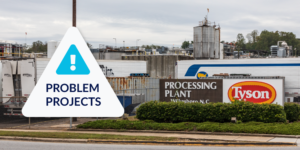
A Kentucky contractor is suing food industry giant Tyson Foods following a payment dispute over construction work at a new poultry processing plant in Tennessee.
Gray Construction, Inc. pursued legal action against Tyson and filed a mechanics lien of $3.4 million after Tyson allegedlyfailed to make payment on five approved change orders and a retainage fee.
The dispute originated over a new poultry processing plant located in Humboldt, Tennessee. In October of 2018, Gray was hired by Tyson as the prime contractor for the construction project.
According to court documents, Gray’s role was complicated by Tyson’s management of the project almost as soon as work began.
Tyson had also hired another prime contractor, Crossland Construction Co., Inc., to handle additional site work including the building pad. The building pad was apparently delivered eight months behind schedule and “without the requisite amount of stone specified, proper drainage, or sufficient compaction.”
Similarly, Tyson is alleged to have redirected one of Gray’s subcontractors for work other than what Gray had hired them for, causing further delays.
Gray’s complaint argues the project delays and errors pushed work into winter conditions and caused it to incur significant additional expenses. Gray also claims to have performed work beyond the original scope of the project in order to repair “improper” work completed by Crossland.
Scope Creep | How to Keep the Scope of Work Under Control
On December 20, 2021, Gray issued a letter to Tyson warning of potential legal action if they did not issue payment within 10 days.
Nine days later, Gray filed suit, alleging Tyson had violated the Tennessee Prompt Payment Act. In a somewhat unusual tactic, Gray also filed and executed a mechanics lien for the disputed $3.4 million on the same day.
“Prime contractors in Tennessee are not technically required to file a lien claim prior to filing an enforcement claim,” according to construction attorney Alex Benarroche, Legal Associate at Levelset. “Prime contractors are only required to file an enforcement action within one year of completion of the work.”
According to court documents, the project’s completion date was October 7, 2021, establishing the lien enforcement deadline October 7, 2022. While most mechanics liens never make it to the enforcement stage, Gray’s early action suggests lien enforcement was already seen as a foregone conclusion.
“Filing an enforcement action simultaneously with the lien claim (and early for that matter) is a fairly aggressive stance, potentially indicating that negotiation talks have broken down,” said Benarroche.
Mechanics liens are incredibly powerful tools for contractors
It shouldn’t be news that a mechanics lien is one of the most powerful tools available to contractors to secure their right to payment. By placing a right on the property, a mechanics lien establishes a secured claim that will persist even through bankruptcy.
Although certainly not immune from industry pressures, Tyson is probably not heading towards bankruptcy any time soon. However, even if it were, Gray’s secured claim would ensure their right to payment was passed on to the next owner of the project property.
The Tennessee poultry plant project was complicated by multiple prime contractors and subcontractors whose resources were being competed for. As delays and errors caused expenses to creep higher, it was incredibly important for Gray to secure their right to payment.
Though it appears to be an uncomfortable situation for all parties involved, Gray’s use of a mechanics lien should protect their right to the $3.4 million.
